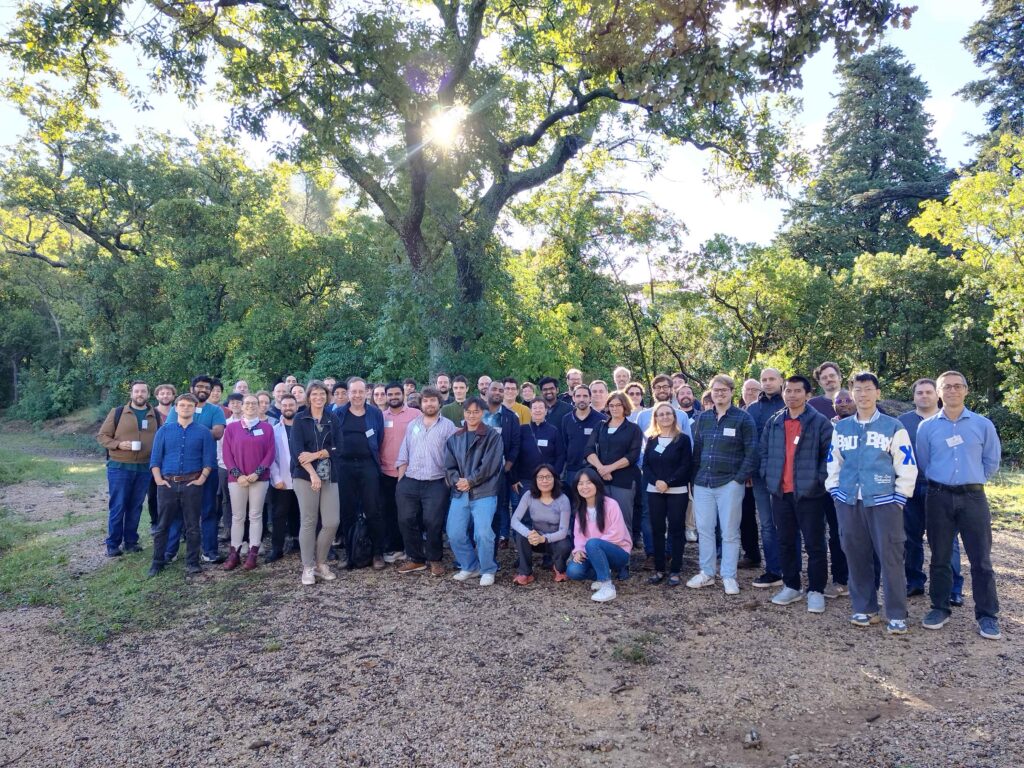CONFERENCE
New trends of stochastic nonlinear systems: well-posedeness, dynamics and numerics
Nouvelles tendances en analyse non linéaire stochastique: caractère bien posé, dynamique et aspects numériques
20 – 24 October, 2025
Scientific Committee
Comité scientifique
Anne De Bouard (CMAP, Ecole Polytechnique)
Arnaud Debussche (ENS Rennes)
François Delarue (Université Côte d’Azur)
Peter Friz (TU, WIAS Berlin)
Michael Röckner (Bielefeld University)
Organizing Committee
Comité d’organisation
Erika Hausenblas (University of Leoben)
Chengcheng Ling (University of Augsburg)
Stéphane Menozzi (Université d’Évry)

Stochastic analysis is a very dynamic field which has undergone numerous developments over the last decades: stochastic differential equations (SDE), stochastic partial differential equations (EDPS), Malliavin calculus…
In order to study new singular complex models, which in particular arise from regularization/de regularization by noise related problems, particle systems, quantum mechanics or machine learning, new ideas have appeared yielding numerous results concerning the well-posedness, dynamics and approximation of singular ED(P)S in numerous scientific or engineering fields. Among these ideas we can mention: the application of convex integration techniques for stochastic equations, the sewing lemma to highlight fine regularization properties of the underlying noise, quantum field theory to help understand quantum dynamics, or the association of classical techniques with tools such as rough paths theory to solve problems which could not be addressed independently.
The overall aim of the workshop is to bring together experts from different disciplines related to singular stochastic systems to facilitate the exchange of ideas. The goal is to identify and motivate novel research directions on the well-posedness, dynamical behavior and numerical simulation of singular stochastic (partial) differential equations.
L’analyse stochastique est un sujet très dynamique qui a connu de nombreux développements au cours des dernières décennies: équations différentielles stochastiques (EDS), équations aux dérivées partielles stochastiques (EDPS), Calcul de Malliavin…
Afin d’aborder de nouveaux modèles complexes singuliers, qui proviennent en particulier de problèmes de régularisation/dé-régularisation par le bruit, de systèmes de particules, mécanique quantique ou de machine learning, de nouvelles idées sont apparues et ont donné de nombreux résultats relatifs au caractère bien posé, à la dynamique et l’approximation d’ED(P)S singulières dans de nombreux domaines scientifiques ou d’ingéniérie. Parmi ces idées on peut mentionner: l’application de techniques d’intégration convexe pour les équations stochastiques, le lemme de la couturière (sewing lemma) pour mettre en évidence des propriétés fines de régularisation par le bruit considéré, la théorie quantique des champs pour aider à comprendre la dynamique quantique, ou encore l’association de techniques classiques à des outils tels que la théorie des trajectoires rugueuses pour résoudre des problèmes qui ne peuvent pas l’être indépendamment.
L’enjeu global du colloque est de faciliter l’échange d’idées entre experts de différentes disciplines associées aux systèmes stochastiques singuliers. Ce congrès servira à identifier et motiver de nouvelles directions de recherches relatives au caractère bien posé, à la description dynamique et à la simulation numérique d’ED(P)S singulières.
SPEAKERS
Hakima Bessaih ( Florida International University) Synchronization in Stochastic Systems: Models and Applications
Nils Berglund (Université d’Orléans) Metastable Allen-Cahn SPDEs and perturbative renormalisation of Phi 4 measures
Dirk Blömker (University Augsburg) Finite-time Lyapunov exponents for SPDEs close to a bifurcation
Lucas Broux (Max Planck Institute) A geometric view upon the renormalisation of the Phi 4 equation
Oleg Butkovsky (Weierstrass Institute) Optimal uniform approximation of occupation time functionals of diffusion processes
Sonja Cox (University of Amsterdam) Weak rates for Galerkin approximations of the stochastic Burger’s equation and other stuff
Konstantinos Dareiotis (University of Leeds) Regularisation by Gaussian rough path lifts of fractional Brownian motions
Anne De Bouard (CNRS, Ecole polytechnique) The Gibbs measure of the renormalized two dimensional stochastic Gross-Pitaevskii equation
Arnaud Debussche (ENS Rennes) From correlated to white transport noise in fluid models
Lucio Galeati (University of Aquila) SDEs driven by fractional Brownian motion with supercritical drifts of bounded divergence
Paul Gassiat (Université Gustave Eiffel) Motion planning, rough controls and deep neural networks
Máté Gerencsér (TU Wien) On the order barriers of approximating SPDEs
Ludovic Goudenège (Université d’Évry-Paris Saclay) Sampling and numerical approximation of stationary measure of fractional SDEs
Martin Hairer (Imperial college London) Fine properties of random fields: from fluids to QFT
Zimo Hao (Bielefeld University) Quantitative approximation of kinetic SDEs: from discrete to continuum
Elena Issoglio (University of Torino) Numerical methods for SDEs with additive noise and distributional drift: strong and weak error rates
Oana Lang (Babes-Bolyai University) Global solutions for stochastically controlled fluid dynamics models
Xue-Mei Li (EPFL) Stochastic Wave Equation with cubic non-linearity
Mario Maurelli (University of Pisa) Anomalous Regularization in Kazantsev-Kraichnan Model
Avi Mayorcas (University of Bath) Ergodicity for Singular SDEs Driven by Fractional Brownian motion
Stefan Metzger (Friedrich-Alexander-University Erlangen-Nürnberg) On the stochastic Cahn-Hilliard equation with dynamic boundary conditions
Annie Millet (Université Paris 1 Panthéon-Sorbonne) On the focusing stochastic NLS equation: critical and inter-critical nonlinearities
Ludger Overbeck (Justus-Liebig-University Giessen) Path-dependent backward stochastic Volterra integral equations with jumps, differentiability and duality principle
Enrico Priola (University of Pavia) Regular stochastic flow and Dynamic Programming Principle for jump diffusions
Martin Redmann (University of Rostock) Dimension reduction for large-scale rough differential equations
Alexandre Richard (CentraleSupélec) Quantitative approximation of the Keller–Segel PDE by moderate particle systems and suppression of blow-up
Ulisse Stefanelli (University of Vienna) Existence and uniqueness in law for doubly non- linear SPDEs
Yoan Tardy (École polytechnique) Existence and Uniqueness in Law for the Keller–Segel Particle System and Its Excursion Decomposition
Esmée Theewis (Delft University of Technology) A unifying Yamada-Watanabe-Engelbert theorem for SPDEs in Banach spaces
Margherita Zanella (Polytechnic of Milan) Long time behavior of the solution to a stochastic Allen-Cahn-Navier-Stokes system with logarithmic potential




